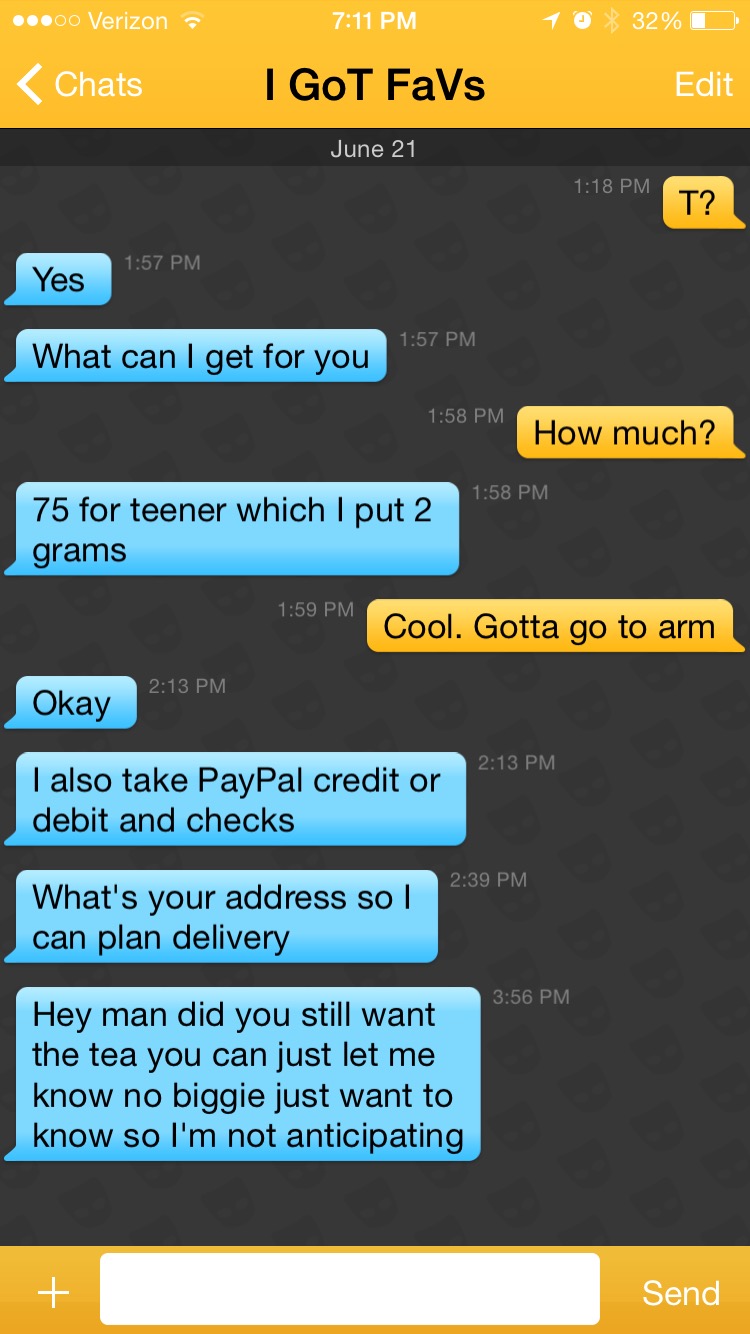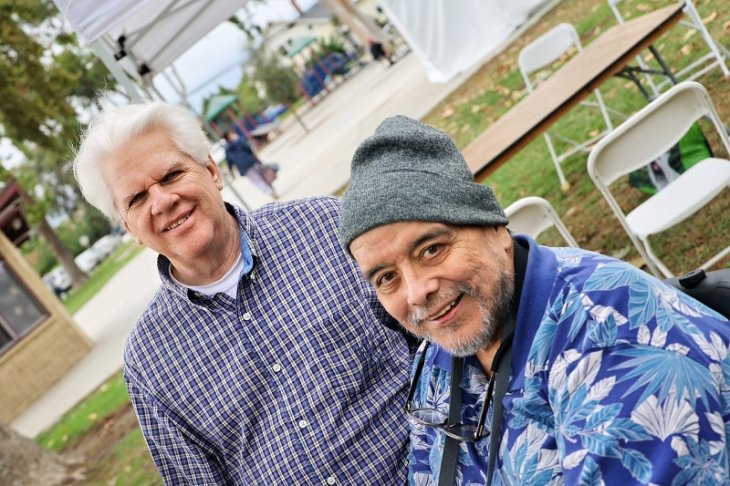
BY HENRY E. SCOTT | AIDS Healthcare Foundation (AHF), no stranger to controversy, recently sparked a heated debate with a billboard campaign linking hookup apps to sexually transmitted diseases. The billboards have images labeled “Grindr” facing one labeled “Gonorrhea” and one labeled “Tinder” facing one labeled “Chlamydia.” Critics blasted AHF for “shaming” gay male sexual culture. Tinder demanded AHF take the billboards down. Others, already alarmed by surges in STD rates among gay men praised the campaign. But sex on demand or an STD is not the most life threatening thing you can get from a stranger, at least on Grindr or Scruff.
Looking for Meth? No need to turn to a drug dealer on a dark corner or cruise the restroom of your favorite gay nightspot. Just hit up “I GoT FaVs” on Grindr. The price he quoted in a recent text exchange with me was “$75 for teener which I put 2 grams.” To make the purchase even easier, he texted: “I also take PayPal credit or debit and checks.” Delivered! Spend a little time on the app and you’ll find plenty of guys looking to “parTy” or “pnp.”
Scruff? Just do a search for “Cloud,” “T,” “Tina,” “Tweaker,” “Party,” “Slammer,” “Smoke” or “Crystal” and you’ll turn up “parTy” boys and dealers with screen names like “TweakerVers69,” ParTyTop,” “ParTyfun,” “Smoker T” and “crystalpartycub.” They are looking to have “sex with Tina,” for “horny tweaky sex,” and in some cases a dealer. BBRTS, a website whose initials stand for “bareback real time sex,” actually includes the question “Drug Use” in its users’ profiles, with possible answers being “Ask Me,” “Yes,” “No,” “Hell No.”
Spend a little more time on Grindr, Scruff or other gay hookup apps and its clear that a “Party N Play” (PNP) culture exists. And it’s a big problem in Los Angeles. That’s not just my perception: it’s such a commonly held perception that people often quip “every gay man in L.A. is either a Meth addict or in recovery.”
Some call Meth “the most dangerous drug on earth” because for many it is instantly addictive and has the ability to quickly and permanently alter the brain. Hardcore users rarely recover (the relapse rate is 88 percent for those who have had treatment) and have a 5- to 10-year lifespan.
In “The Handbook of Drugs and Society” (John Wiley & Sons, 2015), Ralph Weisheit notes that death from a Meth overdose is relatively rare. “But heavy users face other risks,” he writes, listing heart attacks, heat strokes and suicide as three. Then there is the impact of days-long binges during which Meth users rarely sleep or eat and have lots of random sex. Job loss, the destruction of relationships and profound feelings of depression contribute further to a growing sense of worthlessness that can be alleviated only by another Meth binge.
While I have never used the drug, I have experienced its negative impact on several loved ones. An addicted friend once called me, desperate for help, and asked me to take him to the hospital after a week “partying,” eating little food and getting no sleep. He was deranged and placed in a padded psychiatric holding room. Another friend, prominent in the HIV/AIDS activist community, died of AIDS after his Meth use led to him failing to take the daily HIV medication that had kept him alive and active. My most painful experience with Meth occurred several years ago when I watched the man I loved (and still do), destroy his career and our relationship with Meth use. The life of this incredibly handsome, talented and well-educated young man spiraled out of control, leading him to lose his job, attempt suicide and be arrested for assaulting a police officer. At this moment I’m watching another brilliant friend head in the same direction. Despite having a law degree from Yale, he is unemployed with no sense of the direction. In addition to the emotional trauma his addiction has caused, there are the physical effects. Sleeping with him is impossible because of the compulsive twitching of his legs and loud grinding of his teeth, an impact of Meth addiction that leaves some users actually without teeth.
Some have criticized AHF’s STD campaign for its focus on hookup apps. Their argument is that gay men ought to be able to make their own decisions about whether to have sex without condoms and expose themselves to STDS and HIV. So searching for a sexual partner who wants to “bareback” shouldn’t be condemned. Whatever one thinks of that argument (with which I tend to agree), drug dealers should not be allowed to push Meth on gay hookup apps nore should “partiers’ be allowed to solicit people to join them. Grindr and Scruff and similar apps are owned by gay men (Grindr and its founder, Joel Simkhai, are based in Los Angeles) whose stated goal is to bring us together, not kill us or destroy our lives.
While the connection between gay hookup apps and Meth use hasn’t drawn much attention in the United States, it has in Australia. Jay Morris, a recovering Meth addict and a gay health advocate in Australia, has called on the Australian government to shut down sites like Grindr that allow users to promote the use of Meth and to offer to sell and buy it. Australia has a telecommunications law that prohibits phones and the Internet from being used to distribute illegal drugs. The US also has a variety of similar telecommunications laws prohibiting illegal drug activity and provide for severe penalties.
But when Queerty.com, a U.S. based gay news site, posted a story about Morris’s campaign, its author described Morris’s request as a “whack a mole” approach, implying that Meth users would simply go elsewhere to find party drugs. Many of those who commented on the Queerty story agreed.
Yes, Meth users just might drift away from sites like Grindr and Scruff and to other sites to find their “parTy” favors. But citing that as an argument against forcing gay apps to more carefully monitor their drug-related content is like arguing that gun control laws can’t be effective because people will always find someplace to find a gun.
If Grindr’s staff can monitor and approve the photos its users post (a practice necessary to avoid violating the terms of use that Apple has in place for any app that wants to be offered on its iTunes platform) then it and Scruff and other gay hookup apps are also able to scan profiles and posts for Meth-related terms like “crystal,” “tina,” and “T.” And if they won’t, those of us who care about the wellbeing of our brothers should migrate to the first hookup app whose owner decides to do the right thing and stop promoting the use of a drug that is destroying us.
Henry E. Scott, a long time journalist, is the former president of Out Inc., publisher of Out magazine, and currently heads West Hollywood Media Company, publisher of WEHOville.com and West Hollywood Magazine.























